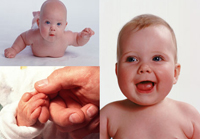Peritonitis in newborns can develop as a result of damage to the development of the gastrointestinal tract, necrotic enterocolite, as well as with inflammatory diseases of the abdominal organs. In most cases, inflammation of the peritoneum takes place contact.
Content
Reasons for peritonitis in newborns
Peritonitis in newborns - polyethological disease, the cause of it can serve perforation of the gastrointestinal tract during its defects, necrotic enterocolitis, as well as inflammatory diseases of the abdominal bodies (for example, acute appendicitis). Bacterial infection of the peritoneum in this case, as a rule, occurs contact. In sepsis, the hematogenous or lymphogenic path of infection in the abdominal cavity is also possible, which leads to the occurrence of metastatic, usually deliberate jets.
According to the degree of propagation, peritonitis is divided into spilled and delimited (abscess). For peritonitis caused by perforation of a hollow organ, characterized by the severe condition of the patient: lethargy, adamina, replacing with periodic excitation, stubborn vomiting with bile and greens. Skin winds of grayish-pale color, dry, cold. Breathing Frequent, surface, heart tones Deaf, pulse is 90-130 per 1 min, weak filling, arrhythmic. Characteristically, a sharp bloating of the abdomen also spilled soreness during palpation. Intestinal peristalsis is not listened, hepatic stupidity is not determined. Chair and gases do not depart. With a survey radiographic study of the abdominal cavity and the chest cavity in a vertical position, free gas under the dome of the diaphragm (pneumoperitoneum) is determined.
The intestinal perforation is most often occurring in necrotic or ulcerative enterocolite, developing against the background of transferred hypoxia or the protracted flow of sepsis, with a violation of microcirculation in the intestinal wall as a result of a long spasm or vessel thrombosis.
 Often in newborns, especially premature, occurs acute appendicitis, which due to late diagnosis becomes the cause of peritonitis. Pathogenesis of acute appendicitis in premature children has its own characteristics. It develops as a result of severe circulatory disorders by the type of infarction in the wall of the process. The determining factor is the excess reproduction in the intestine of the conditionally pathogenic microflora (Klebsiella, protea, the blue rod and T. D.). In the case of the use of massive antibacterial, hormonal and immunostimulating therapy, it is possible to deliver the inflammatory process in the abdominal cavity and the formation of appendicular infiltrate and abscess or interhetelert abscesses. The course of acute appendicitis in prematurenesses is characterized by rapidly increasing toxicosis, stomach and intestinal paresis (vomiting with bile, bloating, lack of chair). Detect classic symptoms of acute appendicitis in prematurely difficult. Nevertheless, part of patients can identify local pain in palpation and muscle tension, swelling and hyperemia in the iliac region on the right. Sometimes it is possible to palpate infiltrate. Helps in the diagnosis of X-ray study (the dimming of the right half of the abdomen, pneumatosis or pneumoperitoneum, eliminated by the tumblers, in the left half of the abdomen are visible to pare-swollen intestinal hinges) and dynamic observation of the patient.
Often in newborns, especially premature, occurs acute appendicitis, which due to late diagnosis becomes the cause of peritonitis. Pathogenesis of acute appendicitis in premature children has its own characteristics. It develops as a result of severe circulatory disorders by the type of infarction in the wall of the process. The determining factor is the excess reproduction in the intestine of the conditionally pathogenic microflora (Klebsiella, protea, the blue rod and T. D.). In the case of the use of massive antibacterial, hormonal and immunostimulating therapy, it is possible to deliver the inflammatory process in the abdominal cavity and the formation of appendicular infiltrate and abscess or interhetelert abscesses. The course of acute appendicitis in prematurenesses is characterized by rapidly increasing toxicosis, stomach and intestinal paresis (vomiting with bile, bloating, lack of chair). Detect classic symptoms of acute appendicitis in prematurely difficult. Nevertheless, part of patients can identify local pain in palpation and muscle tension, swelling and hyperemia in the iliac region on the right. Sometimes it is possible to palpate infiltrate. Helps in the diagnosis of X-ray study (the dimming of the right half of the abdomen, pneumatosis or pneumoperitoneum, eliminated by the tumblers, in the left half of the abdomen are visible to pare-swollen intestinal hinges) and dynamic observation of the patient.
In the absence of perforation of the hollow organ, the pole peritonitis is characterized by a gradual increase in the symptoms of intoxication and the intestinal car. In the analysis of blood, leukocytosis with a shift of the formula left, and a survey radiographic study indicates the presence of a free fluid in the abdominal cavity.
Treatment of peritonitis
Peritonitis treatment must be operational. When perforation - embedding holes in the body of the organ or the removal of the affected area of the intestine on the front abdominal wall, thorough rehabilitation and drainage of the abdominal cavity. In acute appendicitis, there is an appendectomium by a ligature method. Mortality with peritonitis in newborns, especially premature, high.









